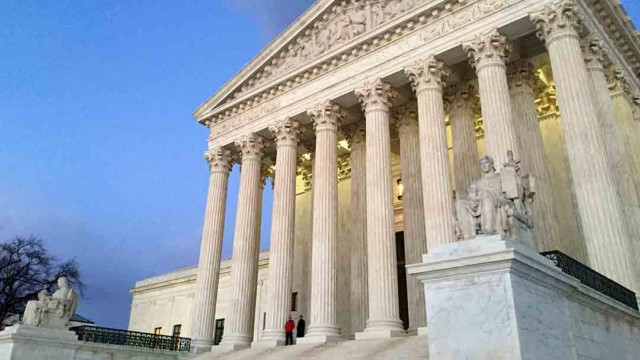The Supreme Court of the United States decided to uphold the so-called travel ban on five Muslim-majority countries.
U.S. President Trump first signed an Executive Order within the first week of his presidency banning travel into the U.S. by nationals of seven Muslim-majority countries: Sudan, Syria, Iran, Libya, Somalia, Iraq and Yemen.
Protests across the U.S. ensued shortly after the ban went into effect.
Several lawsuits also followed the administration’s ban.
The ban took on several iterations—one which removed Iraq, and then later Chad, from the list of included countries, and later included the DPRK and Venezuela.
A judge in Hawaii blocked the Muslim ban in March of 2017—the argument ultimately was the case heard, and ruled on, by the U.S. Supreme Court.
Chief Justice John Roberts wrote the majority opinion, joined by his four conservative colleagues.
“The President has lawfully exercised the broad discretion granted to him… to suspend the entry of aliens into the United States,” the Supreme Court decision read.
The ruling reverses the decisions by the lower courts that worked to block the Trump administration’s measure.
Trump immediately tweeted following the decision.
SUPREME COURT UPHOLDS TRUMP TRAVEL BAN. Wow!
— Donald J. Trump (@realDonaldTrump) June 26, 2018
Shortly following his initial signing of the Executive Order, Trump defended himself against critics who said it was clearly aimed against Muslims, by saying it was not a “Muslim ban.”
However, critics pointed to comments that Trump himself earlier. During a campaign rally in 2015, Trump read a statement to the audience: “Donald J. Trump is calling for a total and complete shutdown of Muslims entering the United States until our country’s representatives can figure out what the hell is going on.”
The Supreme Court decision now upholds that the current Trump policy to restrict entry into the United States for citizens of Iran, Syria, Libya, Yemen, Somalia, DPRK and Venezuela.
In the dissent, Supreme Court Justice Sonia Sotomayor wrote: “The majority here completely sets aside the President’s charged statements about Muslims as irrelevant…that holding erodes the foundational principles of religious tolerance that the court elsewhere has so emphatically protected, and it tells members of minority religions in our country ‘that they are outsiders, not full members of the political community.'”
 CGTN America
CGTN America
 FILE – In this Feb. 13, 2016, file photo, people stand on the steps of the Supreme Court at sunset in Washington. The Trump administration made a plea to the Supreme Court on June 1, 2017, to let travel ban take effect (AP Photo/Jon Elswick, file)
FILE – In this Feb. 13, 2016, file photo, people stand on the steps of the Supreme Court at sunset in Washington. The Trump administration made a plea to the Supreme Court on June 1, 2017, to let travel ban take effect (AP Photo/Jon Elswick, file)
